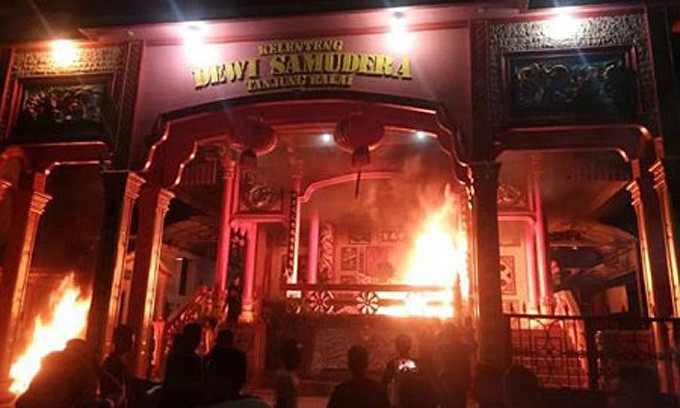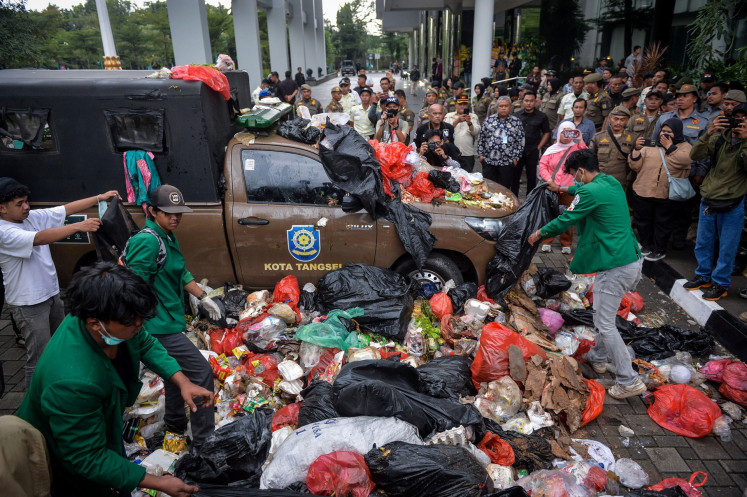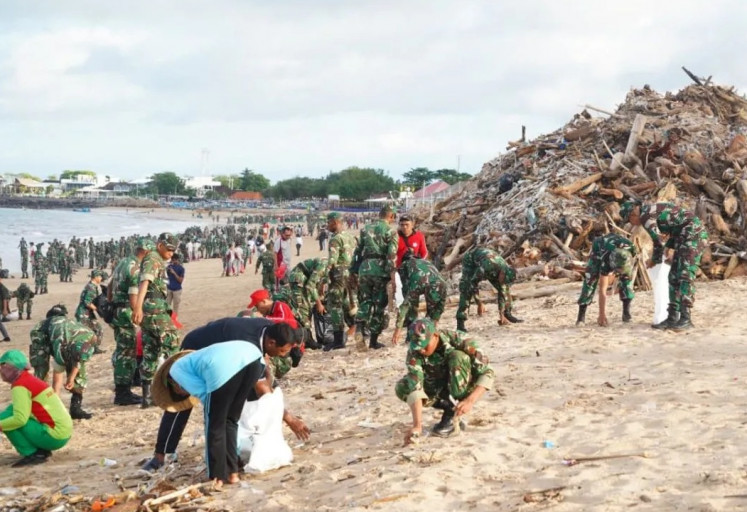Popular Reads
Top Results
Can't find what you're looking for?
View all search resultsPopular Reads
Top Results
Can't find what you're looking for?
View all search resultsWhy, despite democracy, intolerance seems endless
Indonesia must mourn once again after Buddhist temples in Tanjung Balai, North Sumatra, were burned down by a mob a few days ago. Allegedly sparked by a small dispute regarding a complaint about mosque loudspeakers, the incident lengthens the list of intolerance acts in Indonesia, alongside unresolved ones. When will such incidents end?
Change text size
Gift Premium Articles
to Anyone
I
ndonesia must mourn once again after Buddhist temples in Tanjung Balai, North Sumatra, were burned down by a mob a few days ago. Allegedly sparked by a small dispute regarding a complaint about mosque loudspeakers, the incident lengthens the list of intolerance acts in Indonesia, alongside unresolved ones. When will such incidents end?
Regardless of who governs this country, they have to face a great deal when trying to tackle intolerance. Most of the problems occur because of indecisiveness and a lack of stern action when dealing with hard-liners.
Faced with hard-liners, law enforcers often seem totally impotent even though they are supported by advanced equipment.
They may cite the excuse that they have tried their best to handle angry mobs, but the main problem is more about intolerance from both sides: the angry mobs (and maybe Indonesians in general) and law enforcers.
So what is wrong with our culture? Culture is actually a very powerful and useful tool when people are interested in transferring values to younger generations.
But the main problem with culture is its power to prevent people from thinking critically or even simply questioning what they are doing.
This is why culture can be so dangerous when bad values are inculcated for the next generations. And this is exactly the problem facing Indonesia regarding intolerance.
Take the angry mob that burned down the temples.
First, members of the mob were evidently trying to be heroes for their God. But all followers of Abrahamic religions should know exactly who Abraham was. When God revealed his plan to burn down the cities of Sodom and Gomorrah, the holy script reveals that Abraham started to question God: “Will You sweep away the righteous with the wicked? What if there are 50 righteous people in the city? Will You really sweep it away and not spare the place for the sake of the 50 righteous people in it? […] Will not the Judge of all the earth do right?”
The story then continues with Abraham trying to reach 10 righteous people to convince God not to destroy the whole city. This story shows how Abraham was not blinded by obedience to his God. He was seeking God’s moral clarity.
And the most interesting part is about God changing his mind when his chosen people really asked for clarity.
So why can’t hard-liners change their minds when thinking about burning down someone else’s house of worship?
Their actions may indicate that the mob surpassed God’s ability to judge who is right and wrong. It seems to be the case that they thought they were the only righteous people deserving of living in this world, subconsciously proclaiming themselves as God.
It can be clearly seen that such hard-liners never really question their faith. Although faith may demand obedience, should people be led in false directions because of their faith?
To question and critically think about faith is indeed important because by doing so everyone can be Abraham, who finally gained clarity about the disposition of his God.
Being critical can even strengthen our faith so that it cannot be easily shaken off, for example just because non-halal food is served in front of us.
However, the problem here is once again about culture. Our culture never teaches us to question our faith and demands instead that we blindly follow the faith. Just witness the strong reluctance and paranoia every time there is a discussion about freedom of religion and tolerance.
Cultural problems also exist among law enforcers. How many times have we heard their lame excuses about failing to handle mobs? Maybe the main problem here is not their inability to handle mobs but their half-heartedness in doing so. How come they can handle massive labor demonstrations? They may simply say that minor acts of intolerance will eventually fade away as time goes on. But the problem is their half-heartedness, which actually contributes to increasing acts of intolerance.
So there is a vicious cycle in any incident of intolerance because all those involved actually cultivate intolerance.
The hard-liners’ culture prevents them from questioning their faith and thus causes them to be easily led by their emotions and egos. Law enforcers’ culture, meanwhile, shows the reluctance to deal with hard-liners.
So hard-liners will continue with their so-called holy war because law enforcers never really want to deal with them. This is why intolerance has yet to end in Indonesia.
The only way lies in us having the courage to radically end intolerance cultures. And it can only happen when we start to ask questions, like what Abraham asked his God — if there is only one righteous person living there, should I burn it down? Or should I protect the righteous one?
***
The author, a chemical engineer, won the Ahmad Wahib Award in its annual interfaith writing contest in 2012.
---------------
We are looking for information, opinions, and in-depth analysis from experts or scholars in a variety of fields. We choose articles based on facts or opinions about general news, as well as quality analysis and commentary about Indonesia or international events. Send your piece to community@jakpost.com.










